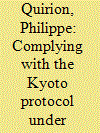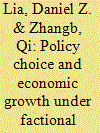|
|
|
Sort Order |
|
|
|
Items / Page
|
|
|
|
|
|
|
| Srl | Item |
| 1 |
ID:
098598


|
|
|
|
|
| Publication |
2010.
|
| Summary/Abstract |
The Kyoto Protocol allocates tradable emission allowances (AAUs) to developed countries, but they are free to choose a set of policy instruments to comply with these targets. We compare two different policy instruments: a tax and purely domestic tradable permits, for the European Union, the US and Japan. Information on abatement costs and international permit price is imperfect and stems from nine global economic models. For a country party to the Protocol, the benefit of emission reduction is that it can sell more or has to buy less AAUs. We show that in this context, permits entail a slightly lower expected cost than a tax for the US and Japan, whereas both instruments yield an almost equal outcome for Europe. Applying Weitzman's framework (Prices vs. quantities, RES, 1974) in this context, we show the importance of the positive correlation between costs and benefits: technology shocks that lead to low abatement costs in one country generally lead to low abatement costs in other countries too, thereby leading to a low international permit price in the true-up period.
|
|
|
|
|
|
|
|
|
|
|
|
|
|
|
|
| 2 |
ID:
138851


|
|
|
|
|
| Summary/Abstract |
Richard Betts argued that strategy—the idea that a state’s political ends could be reliably linked to its coercive means—is a necessary illusion. Without strategy, war is mindless killing; but its rationales cannot guide state choices because there is a yawning gap between the macro level where strategy is articulated and the micro level of day-to-day choices. That gap is particularly insurmountable when beginning, as Betts does, from a rationalist model of action. I propose that grand strategy is best understood as a case of collective intentionality, a concept that amends the rationalist framework in a way that makes it possible to clarify an analytic pathway from grand strategy to state behavior. Crucial to this pathway are legitimation processes found in forums, and I argue that grand strategies can pull state behavior when they are tied to forums. Focusing on the interstate case, I develop a causal mechanism from the forum, to ways of talking, to commitment-consistent behavior. I illustrate the argument with an example from the Concert of Europe. Stacie E. Goddard and Ronald R. Krebs propose that legitimation processes might be particularly successful where institutions are weak. My framework helps flesh out that proposition: even in anarchy, action commitments can affect states’ behavior through the mechanisms of the forum.
|
|
|
|
|
|
|
|
|
|
|
|
|
|
|
|
| 3 |
ID:
145131


|
|
|
|
|
| Summary/Abstract |
An important part of Beijing’s strategy to reduce the welfare gap between urban and rural parts of China has been the promotion of urbanisation. Replacing peasant agriculture with commercial operations of scale is an integral part of this endeavour. This article analyses the implementation of policies meant to transform the structure of Chinese agriculture. It argues that the central government is using a set of very flexible policies, project-based implementation and adaption to local conditions to guide and support an existing dynamic of structural transformation in agriculture. Local governments, in turn, appreciate the flexibility, the political predictability, the potential revenue improvements and the cognitive framework inherent in these programmes. The article is primarily based on interviews with leading cadres at the township and county levels in the provinces of Shandong, Sichuan and Guizhou between 2008 and 2010.
|
|
|
|
|
|
|
|
|
|
|
|
|
|
|
|
| 4 |
ID:
161765


|
|
|
|
|
| Summary/Abstract |
This paper investigates how political elites make policy choices that have bearing on an authoritarian regime's economy, from the perspective of factional politics. A local leader makes policies primarily to secure his political survival, which is contingent on the support from either his higher-level patrons or his local grassroots constituents. Using a simple model, we show that a local politician with close factional ties to high-level patrons will invest more in sending loyalty signals to the latter to receive their protections, while a poorly-connected politician will make more effort to spur a broad-based economic growth that economically benefits his local constituents. Using a unique county level data on the factional politics of Zhejiang Province, China, we find that counties with weaker (closer) factional ties have lower (higher) tax burdens per capita, while spending more (less) on local public goods provision. The results are stable after various robustness tests.
|
|
|
|
|
|
|
|
|
|
|
|
|
|
|
|
|
|
|
|
|